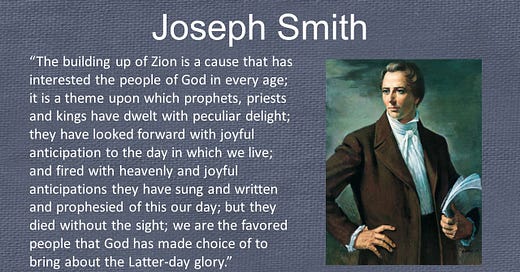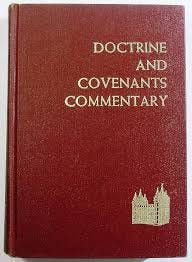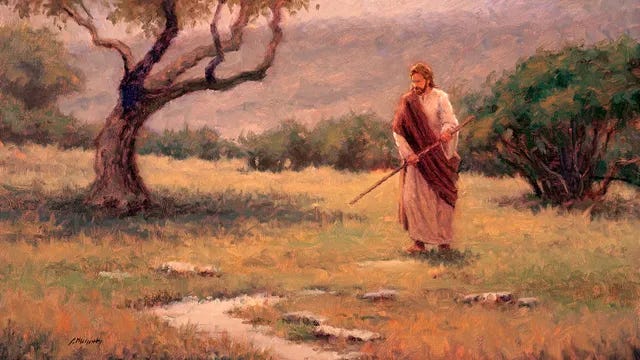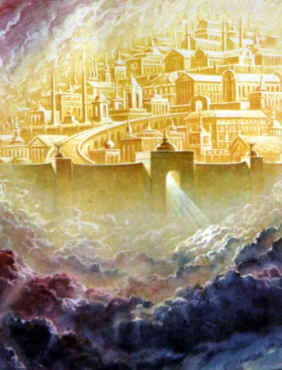Organized According to My Laws
Historical Background and Reflections on Doctrine and Covenants 51
In Lyndon W. Cook’s book The Revelations of the Prophet Joseph Smith we learn more about the historical background for Doctrine and Covenants 51.
Date. May 1831. (20 May).
Place. Thompson, Geauga County, Ohio.
Historical Note. As the New York Saints began to arrive in Ohio in May 1831, Church leaders sought further direction in organizing themn according to the law of consecration. In response to the request of Bishop Edward Partridge, Jospeh Smith inquired of the Lord and received section 51.
Orson Pratt, in 1874, stated that he was present when this revelation was received. He said “no great noise or physical manifestation was made; Joseph was as calm as the morning sun.” However, Pratt noticed a change in the Prophet’s countenance, “His face was exceedingly white, and seemed to shine.”
Textual Note. Verse 5 of section 51, as we now have it, was not originally part of the revelation, but subsequently added. The following passages, relating to the law of consecration, were initially part of the revelation but subsequently deleted. These verses, as well as other instructions on the subject of obtaining deeds, seem to form the basis for Bishop Edward Partridge’s actions in retaining title to all consecrated properties in Jackson County, Missouri:
“Wherefore let my servant Edward receive the properties of this people which have covenanted with me to obey the laws which I have given and let my servant Edward receive the moeny as it shall be laid before him according to the covenant and go and obtain a deed or article of this land unto himself of him who holdeth it if he harden not his heart for I have appointed him to receive these things and thus through him the properties of the church shall be consecrated unto me.”
When members of the Church arrived in Missouri they were to convey to the bishop legal title to their assets. While surplus consecrations were to be used for the benefit of the poor (and therefore retained by the bishop), the bishop was to provide “inheritances” for the Saints. Normally this would be achieved by turning back to each member his personal property as well as a parcel of land. What is interesting, however, is that initially this distribution did not secure to the member private ownership of his stewardship. Early contracts used by Bishop Partridge in Jackson County stipulated that real estate was “leased” to the individual member, that personal property was “loaned,” and that in cases of transgression or unworthiness, members forfeited any or all of their stewardship properties. These early arrangements were defective for obvious reasons and, when challenged by some dissenters, were not upheld by the courts. These procedures were subsequently modified so as “to give a deed, securing to him who receives… his inheritance… to be his individual property, his private stewardship.” It was also agreed that if a member was determined not worthy to belong to the Church, he could claim that to which he held title but could not claim gifts or donations he had made to the bishop.
Publication Note. Section 51 was first published as section 23 in the 1835 edition of the Doctrine and Covenants. (pp. 69-70)
The Saints migrating from the eastern states began to arrive in Ohio, and as noted in McConkie’s section heading, it became necessary to make definite arrangements for their settlement. Bishop Edward Partridge sought instruction on this matter that belonged particularly to his office, and when the Prophet Joseph Smith inquired of the Lord he received the revelation that is now D&C 51. In this section Edward Partridge was appointed to regulate stewardships and properties, the Saints were commanded to deal honestly, receive alike, have a bishop’s storehouse, and organize properties according to the Lord’s law. Ohio was designated as a temporary gathering place.
Let’s study this section a bit at a time:
Hearken unto me, saith the Lord your God, and I will speak unto my servant Edward Partridge, and give unto him directions; for it must needs be that he receive directions how to organize this people.
For it must needs be that they be organized according to my laws; if otherwise, they will be cut off.
Wherefore, let my servant Edward Partridge, and those whom he has chosen, in whom I am well pleased, appoint unto this people their portions, every man equal according to his family, according to his circumstances and his wants and needs. (D&C 51:1-3)
The Lord was well pleased with Edward Partridge and his fellow servants. They were earnestly seeking and doing the Lord’s will, and the Lord commended them for their goodness and integrity. He also revealed the manner in which to proceed to help the Saints to live His law of consecration. The Lord knows how to organize His people according to His laws, and during this early period in the Church, He directed the pious and trustworthy Edward Partridge to parcel out the stewardships of the Saints.
What did it mean for Edward Partridge to appoint unto the Saints their portions? As mentioned above, it usually meant returning to each member his previous personal property (and sometimes more) along with a parcel of land. Each Saint and his family received a portion and an inheritance in Zion that was under his private stewardship. This distribution of portions and inheritances was designed to be just and equitable according to the family and circumstances of each Saint, and even according to his wants and needs. Our generous Lord provides abundantly for His Saints in His way, and each Saint is given a sacred stewardship.
Regarding this Section and these introductory verses to this Section, Smith and Sjodahl observe:
Shortly after the Revelation recorded in Section 50 had been received, the Saints from Colesville, N.Y. began to arrive in Ohio. They had been directed to gather in that locality (Sec. 37:3) and they had been promised that there they would receive the Law (Sec. 38:32). The Saints in Ohio had been instructed to divide the land with their Eastern brethren (Sec. 48:2), and it was the duty of Edward Partridge, who had been appointed Bishop (Sec. 36) to take care of the newcomers, as far as possible. Under the circumstances, Bishop Partridge asked for divine guidance. The Prophet inquired of the Lord for him, and received this answer to his prayers.
In this Revelation our Lord gives instructions concerning the temporal organization of His people. We learn from it that it was the special duty of the Bishopric to have charge of the temporal affairs of the Church, under the direction of the Prophet. The temporal organization (1) must be effected in accordance with the Law of God (1-3); (2) it must include (a) the just and equitable treatment of transgressors (4-6); (b) the appointment of an agent for the community (7-9); (c) just and equitable dealing with other churches (10-12); (d) the establishment of a storehouse and a provision for adequate compensation for services rendered (13-15); (3) the location of the Colesville Saints in Ohio was only temporary (16-17); but (4) their organization was, nevertheless, to be a pattern for the future (13-19); (5) Christ’s promise to His people (20).
Temporal Organization
Need] Read, “needs,” as in verse 2, and elsewhere. The word is originally a genitive form and means, “of need,” “of necessity,” but it is used as an adverb for “necessarily.”
According to my laws] Even the temporary organization of the people of God must be effected in accordance with the laws of God. All things are spiritual to God (Sec. 29:34, 35). All things should be spiritual to man.
Cut off] Unless the organization is in accordance with divine laws, it will not be permanent. There have been many attempts in the world to create a Utopia on the basis of the consolidation of interests. Their failure is due chiefly to the fact that God has not been consulted in their organization. An individualistic society is not much of a success without God; and a communistic society without Him is impossible. God warned His people at the outset of the consequences of attempting an organization, such as contemplated in the Revelations, except in accordance with His law; they will be “cut off” as the dry branches of a tree, that have become useless.
Equal according to their *** needs] The Lord here instructs Bishop Partridge, and the two counselors, whom he had chosen, to locate the Colesville Saints at Thompson, a place not far from Kirtland, and to see that each man received a portion of property equal to his needs. Equality in a community organized according to the laws of God does not mean a division of property in equal shares, but in shares equal to the needs of each family or person. One who has a large family needs a larger portion than he who has but few to take care of. One who has a large business to manage needs more capital than one who works for wages. But there is perfect equality when each has what he needs and no more, and that is the ideal state of society, under the law of God. (pp. 296-297)
I mostly agree with Smith and Sjodahl on these points, although they leave out any commentary on the Lord’s use of the word “wants.” I don’t think that the Lord intended for His Saints just to scrape by, but that each one of them with their families would flourish, prosper, improve their stewardships, and enable the poor among them to rise and flourish in the same way. The Lord was building another Zion people, like Enoch’s people or like the people in the third book of Nephi who were filled with the love of Christ and had all things in common, with no poor among them. The Lord’s system isn’t just one among many possible economic systems, such as capitalism or communism. The Lord’s ways are higher than our ways and He knows exactly how to provide for His Saints in a Zion society.
The revelation in D&C 51 continues:
And let my servant Edward Partridge, when he shall appoint a man his portion, give unto him a writing that shall secure unto him his portion, that he shall hold it, even this right and this inheritance in the church, until he transgresses and is not accounted worthy by the voice of the church, according to the laws and covenants of the church, to belong to the church.
And if he shall transgress and is not accounted worthy to belong to the church, he shall not have power to claim that portion which he has consecrated unto the bishop for the poor and needy of my church; therefore, he shall not retain the gift, but shall only have claim on that portion that is deeded unto him.
And thus all things shall be made sure, according to the laws of the land. (D&C 51:4-6)
Regarding these verses Smith and Sjodahl observe:
Equitable Treatment of Transgressors
Give unto him a writing] In the community there would always be some who would wish to draw out and, perhaps, embarrass the rest by lawsuits, or otherwise. In order to prevent such designs, just and equitable provisions were to be made and secured by legal agreements. The plan was that everybody should transfer his property to the Bishop. Then the Bishop should deed back whatever each one needed. This was his stewardship. The surplus was to be retained by the Bishop for the benefit of those who, through sickness or age, were unable to contribute their share to the common fund of labor. If anyone transgressed and was counted unworthy of membership in the church, he also lost his standing in the society, but in that case he was to retain the property deeded to him, but have no claim on the portion set apart for the maintenance of the poor and needy. (p. 298)
The revelation continues:
And let that which belongs to this people be appointed unto this people.
And the money which is left unto this people—let there be an agent appointed unto this people, to take the money to provide food and raiment, according to the wants of this people.
And let every man deal honestly, and be alike among this people, and receive alike, that ye may be one, even as I have commanded you. (D&C 51:7-9)
Again, the Lord was creating a Zion people, the Pure in Heart, of one heart and one mind. Saints in Zion are honest and united. They assist and uplift the poor. They love each other and improve their stewardships. In essence, Zion is the polar opposite of the world, or of the society in which we now live. It is the polar opposite of the selfish, materialistic, tumultuous, stratified, segregated, Hobbesian modern America. It is the opposite of Babylon.
The Lord’s Zion society is also a society of order. The portions and inheritances of the Saints could only be claimed in writing, according to righteous living, and according to the laws of the land. One might wonder why the Saints can no longer claim their portions and inheritances in Zion? What happened? What went wrong? I’m sure that we will learn more about it as we continue our study of the Doctrine and Covenants.
Smith and Sjodahl’s commentary on these verses is interesting and helpful for our study:
The Agent and His Duties
That which belongs to this people] The stewardship of each individual was to be secured to him by a legal deed; in the same way, the common property was to be secured to the people.
Let there be an agent appointed] The community was to be represented by an Agent, whose special duty it would be to handle the money required for food and clothing by the people. There is great wisdom manifested in the distribution of responsibilities. The Bishopric would receive the property, distribute it in “stewardships,” and receive the earnings of each stewardship; the Agent would see to it that property was not unduly accumulated, but that the needs of all were supplied.
Be alike] By this means it would be possible to preserve equality and unity, as God has commanded (See Sec. 49:20). The plan was admirable in every respect. Under it, every member would have been absolutely independent. All would have had the benefit of whatever inventive genius, productive power, or business ability, existed in the community. Not only would poverty have been abolished, but all would have been wealthy, by having a share in the common resources. Honesty, however, would have been absolutely necessary. There can be no success, in a communistic society, unless the members are first made honest, through the gospel. It is a notable fact that when nations, now-a-days, because of war or other calamities, are in danger of a shortage of food, for instance, a wise government immediately takes possession of all the supplies on hand and forces the people, to that extend, into a united order, with distributing agents. Individualism is then abandoned as inadequate. But if this arrangement is superior in times of scarcity, why would it not be equally superior in times of abundance? In 1857 Heber C. Kimball told the saints in Salt Lake City:
“In the house of Israel there is now clothing enough to last us ten years and make us comfortable, if it could be put into the storehouse of God and properly distributed, to clothe men, and their wives, and children, who may be worthy and needy. That is the Apostle’s doctrine, you know” (Jour. of Dis., Vol. V., p. 33).
How many years’ supply would there be in Israel now, if all necessaries of life were stored and distributed according to this plan? (pp. 298-299)
As I see it, there is only only small problem with Smith’s and Sjodahl’s reasoning. They fail to account for the fact that some Saints are stronger, smarter, work harder, are more ambitious, and produce more than others. In a Zion society, however, there is even greater motivation to be industrious and produce more because the Saints are eager to build the Kingdom of God on the earth instead of merely laboring to satisfy their vain ambitions and selfish cravings.
In modern America and even in the Church, the rat-race and the hamster wheels characterize most of even the best side of the world of work. The secret combinations and conspiracies that turn the hamster wheels and incentivize the rat-race are another story. Furthermore, the combined assets of the Church of Jesus Christ of Latter-day Saints are now well beyond anything imaginable in the early days of the Church. If we truly lived the Lord’s laws, including His Law of Consecration, there would be even greater abundance and prosperity. One might reasonably wonder why Zion has been delayed and why class divisions in the Church are more pronounced than ever before. Could it be that the Book of Mormon warnings that were meant for our day have not been heeded? Could it be that we have not learned the lessons of history and that we are following the same pattern of the Nephite and the Jaredite civilizations that the Lord destroyed because of their pride and wickedness?
The revelation continues:
And let that which belongeth to this people not be taken and given unto that of another church.
Wherefore, if another church would receive money of this church, let them pay unto this church again according as they shall agree;
And this shall be done through the bishop or the agent, which shall be appointed by the voice of the church. (D&C 51:10-12)
This makes sense.
Smith and Sjodahl comment on these verses as follows:
Each Community Independent.
That which belongeth to this people, *** church] The word “church” in this paragraph stands for “Branch,” as in Sec. 20:81; 45:64, and elsewhere. The meaning conveyed is that the property owned by the Colesville Branch could not be claimed by any other Branch.
If another church would receive money] In their business transactions with each other the Branches of the Church were to follow the business rules that honorable men observe as individuals.
The bishop of the agent] Business representatives of the community. (p. 299)
The revelation continues:
And again, let the bishop appoint a storehouse unto this church; and let all things both in money and in meat, which are more than is needful for the wants of this people, be kept in the hands of the bishop.
And let him also reserve unto himself for his own wants, and for the wants of his family, as he shall be employed in doing this business.
And thus I grant unto this people a privilege of organizing themselves according to my laws. (D&C 51:13-15)
Edward Partridge must have been a very good, wise, and righteous man to have been entrusted with such a great responsibility. Notice again the Lord’s use of the word “wants.” The Lord is not miserly with the abundance that He has created for us, and He understands both our needs and our righteous desires or wants. The Lord did not impose this law upon Joseph Smith and the early Saints, rather, He granted unto them the privilege to organize themselves according to His higher laws. Why don’t we do this anymore in the Church? Why have the modern Saints lost this privilege?
Smith and Sjodahl write:
The storehouse and Compensation.
Appoint a storehouse] A general storehouse would be needed, in which to care properly for such products of the community, as grain, vegetables, meat, raw materials of every kind, manufactured articles, works of art, etc., as well as money.
Let him also reserve unto himself for his own wants] The bishop was given the custody of the storehouse with the privilege of reserving unto himself the substance needed for the wants of his family while he was employed in the business of the Church.
Grant unto this people a privilege] The law of the United Order was given to the Colesville Branch as a boon, a privilege. God, who knew the weakness of His people, did not, at this time, give it with the force of a peremptory command. But some day the Saints will be required to observe this law, for Zion cannot be redeemed without it. (p. 300)
I disagree slightly with Smith and Sjodahl on this point because the privilege of living the Lord’s laws is just that, a privilege, and not something that can ever be forced. In other words, true Saints will observe the laws of God, including the law of consecration, because they truly want to do so, and not just because it will be required of them. Perhaps this is the real reason why we no longer observe these laws of the Lord in the Church: we don’t want to. We would rather work for and build up Babylon than create a Zion society. I know that there are exceptions to this rule, but clearly the Zion society that the Lord hoped to establish among His Saints is currently nowhere to be found.
The revelation continues:
And I consecrate unto them this land for a little season, until I, the Lord, shall provide for them otherwise, and command them to go hence;
And the hour and the day is not given unto them, wherefore let them act upon this land as for years, and this shall turn unto them for their good. (D&C 51:16-17)
If the Saints knew that they would soon move to Missouri, and then to Nauvoo, and then to other places, they might not be as earnest in their efforts to build Zion. Furthermore, consider the amazing community that the Saints built in Ohio and their miraculous experiences. The Lord, in His wisdom, allowed His Saints to learn and to grow before revealing the next step.
A Temporary Location
For a little season] The location of the Saints at Thompson was only temporary. Those who came there did not generally accept the order revealed to them (Sec. 56:6), wherefore the humble and contrite among them were given permission to go to Missouri (Sec. 56:7)
Let them act *** as for years] They were, however, to perform their temporal duties, as if they were to remain at Thompson for years. That is always a good rule, “Whatsoever thy hand findeth to do, do it with thy might” (Ecclesiastes 9:10) (p. 300)
The revelation continues:
Behold, this shall be an example unto my servant Edward Partridge, in other places, in all churches.
And whoso is found a faithful, a just, and a wise steward shall enter into the joy of his Lord, and shall inherit eternal life. (D&C 51:18-19)
This is what God’s plan is all about: preparing His children to inherit eternal life. These verses should remind us that Joseph Smith was still translating the New Testament because they contain a direct reference to the Lord’s teachings to His disciples in the Old World:
Who then is a faithful and wise servant, whom his lord hath made ruler over his household, to give them meat in due season? (Matthew 24:45)
His lord said unto him, Well done, thou good and faithful servant: thou hast been faithful over a few things, I will make thee ruler over many things: enter thou into the joy of thy lord. (Matthew 25:21)
He that is faithful in that which is least is faithful also in much: and he that is unjust in the least is unjust also in much. (Luke 16:10)
The LDS Come Follow Me manual contains the following commentary on this section:
The Lord wants me to be a faithful, just, and wise steward.
If you were a Church member in 1831, you might have been invited to live the law of consecration by signing over your property to the Church through the bishop. He would then return to you, in most cases, what you donated, sometimes with a surplus. But it was no longer just your possession—it was your stewardship.
Today the procedures are different, but the principles are still vital to the Lord’s work. As you read section 51, think about what God has entrusted to you. What do the words “steward” (verse 19) and “consecrated” (verse 5) imply about God’s expectations of you?
President Spencer W. Kimball explained: “In the Church a stewardship is a sacred spiritual or temporal trust for which there is accountability. Because all things belong to the Lord, we are stewards over our bodies, minds, families, and properties. (See Doctrine and Covenants 104:11–15.) A faithful steward is one who exercises righteous dominion, cares for his own, and looks to the poor and needy” (“Welfare Services: The Gospel in Action,” Ensign, Nov. 1977, 78).
See also “The Law of Consecration” (video), Gospel Library.
To be honest, this sounds like a major cop out: “Today the procedures are different, but the principles are still vital to the Lord’s work.” The procedures are different? Why? What happened? Did the Lord change His mind? If the principles are still vital, why do we pretend that there are new “procedures” that obviate the “principles”?
This is a great example of what I consider to be the dumbing-down or dilution of the LDS curriculum. Of course we can be good stewards over our bodies, minds, families, and properties as Kimball recommends, but obviously the Lord had much more in mind when He began to establish Zion and His law of consecration among His early Saints.
One might reasonably wonder: are there any faithful and wise stewards in the Church today? Of course we can exercise righteous dominion, care for our own, and look to the poor and needy, but clearly the Lord had a greater purpose in mind for revealing His laws to His early Saints, a purpose that we as a Church have yet to truly fulfill. Moreover, I don’t think that the Lord wants us merely to “look to the poor and needy,” but to build the New Jerusalem and eliminate poverty altogether.
I agree with most of the first part of the conversation in this video, but then it veers into excuses similar to those given in the LDS Come Follow Me manual. The interlocutors do, however, end with a great question: What are we going to do with the law of consecration?
The Colesville Organization a Pattern.
This shall be an example] The instructions to the Colesville Saints regarding their temporal affairs were to be a pattern to other Branches of the Church.
Churches] See verse 10.
Whoso is found faithful *** eternal life] The Lord promises those who are faithful, just, and wise as His “stewards” over the temporal things entrusted to their care an entrance into the “joy of his Lord” and eternal life. We are apt to regard a blissful hereafter as a reward for the faithful performance of such duties as attending meetings, praying, engaging in devotional studies, giving alms, etc., and all such manifestations of a new life are as natural to those who are born again of the water and the Spirit, as are breathing, eating, etc. to man’s physical existence. But we must not forget that to take care of whatever material and temporal gifts we may have is just as much the duty of a Latter-day Saint, as to attend meetings and to pray. All our talents should be used for the furtherance of the Kingdom of Christ. There is no such real distinction between things temporal and eternal as men frequently draw. The fact is that we are now in eternity, as much as we ever will be, and we are surrounded everywhere by things of eternal portent. (pp. 300-301)
This is a great point. One of the main reasons I created this Substack and immersed myself in the Doctrine and Covenants is to do just this, to devote all my talents to the furtherance of the Kingdom of Christ. How can we as Latter-day Saints ever hope to build up the Kingdom of God on the earth and establish Zion if we don’t even know what the Kingdom of God or Zion are? How can we do any better than the early Saints if we don’t understand and learn from their experience? How can we create a truly Zion society if we devote most of our time, talents, and money to Babylon?
I am certainly far from perfect, but I yearn for Zion just as much as the early Saints did. We are now in eternity, surrounded everywhere by things of eternal portent. What are we going to do with the law of consecration?
The revelation concludes:
Verily, I say unto you, I am Jesus Christ, who cometh quickly, in an hour you think not. Even so. Amen. (D&C 51:20)
Smith and Sjodahl conclude their commentary on this verse and on this section as follows:
Christ’s Promise.
Who cometh quickly] The Lord again promises His people that He will come quickly. This fact He impresses upon our minds again and again. May we realize it.
“Even so, come, Lord Jesus” (Rev. 22:20)
General Notes.
There have been some successful attempts to practice unity in temporal affairs. Enoch preached the gospel in his day, and those who believed were gathered and lived in a United Order. “They were of one heart and one mind, and dwelt in righteousness; and there was no poor among them” (Pearl of Great Price, Book of Moses 7:18). Their city existed for 365 years, and then the Lord took Enoch and his Zion up to Him, before the flood came. They were translated or changed in a moment, as the Saints of the latter days will be at His coming.
In the year 36 A.D. a great many Nephites and Lamanites were converted and united in a society in which all property was held common. “Therefore they were not rich and poor, bond and free, but they were all made free, and partakers of the heavenly gift” (IV. Nephi v. 3). This blessed condition lasted more than 150 years (George Reynolds, Story of the Book of Mormon, p. 484], when they began to be lifted up in pride and to wear costly clothes and ornaments. “And from that time forth they did have their goods and their substance no more common among them” (IV. Nephi v. 25). Pride was the death of brotherhood.
The first converts in Jerusalem, who embraced the gospel at the time of Pentecost, sold their “possessions and goods” and distributed to all according to the needs of each. It may be supposed that they retained their homes, as provided by the Mosaic law, and also other things necessary for their own maintenance, and that they sold the rest for the benefit of the needy Saints, at the same time extending their hospitality to all (Acts 2:45). That which was intended for distribution was laid at the feet of the Apostles. They were the representatives of the Lord, and the money was, therefore, in fact, given to Him. Not one of them said that his possessions were his, but everyone considered himself as the Lord’s steward. The consecration of their property was entirely voluntary, as is clear from the story of Ananias (Acts 5:4). In all ages, when the Spirit of God has been poured out upon the people in an abundant measure, they have proved their love of God by an unselfish love of their fellowmen, God’s children. (pp. 301-302)
We have at least these three successful examples to learn from, and even the example of the early Saints in this dispensation was more successful than we modern Saints have been thus far. The doctrine, principles, patterns, commandments, and covenants of Zion are before us, and the Lord still knows how to create a Zion community. The Lord is not the limiting factor in this formula.
Despite my criticisms of the modern Church of Jesus Christ of Latter-day Saints, or of the corporation that carries the Lord’s name, I know that there are many good and wonderful Saints who are as eager to build the Kingdom of God on the earth and establish Zion as ever Enoch, Nephi, Peter, or Joseph Smith were. There are many who are Pure in Heart and desirous to become a people of one heart and of one mind, and to eliminate poverty.
It seems to me that we modern Saints feel Joseph Smith’s absence keenly, and we also feel Enoch’s absence keenly. But they are not really absent, and neither is the Lord. In fact, I’m certain that Enoch, Joseph Smith, Nephi, Peter, and all the prophets and Saints are anxiously engaged in the Lord’s work and eager to help us modern Saints to create the most successful Zion society that the world has ever known. May it be so, I pray in the name of Jesus Christ, Amen.













